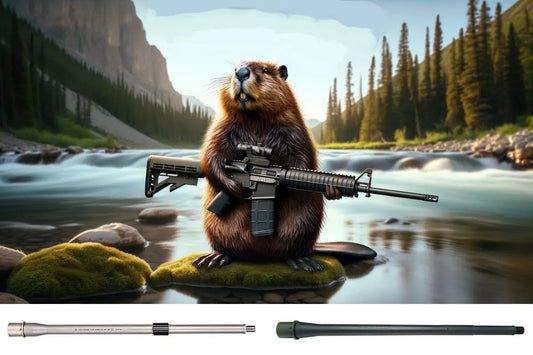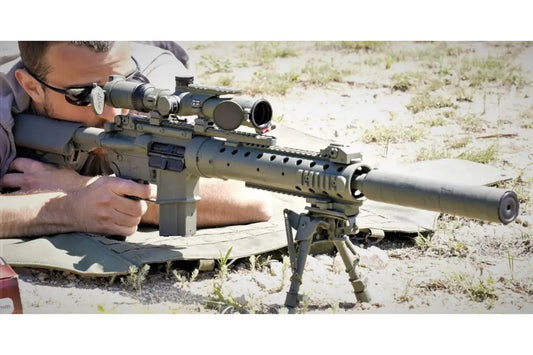
12-Gauge vs. 20-Gauge Shotguns: How to Choose the Perfect Fit for Your Needs
When it comes to selecting a shotgun, the debate between choosing a 12-gauge or a 20-gauge has been a longstanding one among enthusiasts. Both options cater to a variety of shooting needs, from hunting to home defense, and each has its strengths and weaknesses. This guide will break down the differences, advantages, and scenarios where each gauge shines, helping you make an informed choice that aligns with your goals.
Understanding Shotgun Gauges
Before diving into specifics, let’s clarify what "gauge" means in the context of shotguns. Unlike rifle or handgun calibers, which are measured in inches or millimeters, shotgun gauges are determined by the weight of a solid sphere of lead that fits the barrel’s diameter. For instance, a 12-gauge means that a lead ball fitting the barrel weighs 1/12th of a pound, while a 20-gauge means the lead ball weighs 1/20th of a pound.
This inverse relationship means that the smaller the gauge number, the larger the barrel diameter. As a result, a 12-gauge shotgun is generally more powerful but also heavier, while a 20-gauge offers lighter recoil and is easier to handle.
Key Differences Between 12-Gauge and 20-Gauge Shotguns
1. Power and Payload
- 12-Gauge: Known for its versatility, the 12-gauge offers a larger payload of shot, making it ideal for situations where stopping power is critical. It’s the go-to choice for big game hunting, waterfowl, and home defense.
- 20-Gauge: While not as powerful as the 12-gauge, the 20-gauge still delivers ample performance for small game hunting and clay shooting. Its lighter payload results in less recoil, making it a popular choice for beginners and smaller-framed shooters.
2. Recoil
- 12-Gauge: With great power comes great recoil. A 12-gauge shotgun’s kick can be intimidating for new or less experienced shooters.
- 20-Gauge: Thanks to its smaller size and lighter payload, the 20-gauge generates significantly less recoil, providing a more comfortable shooting experience, especially during extended sessions.
3. Weight and Maneuverability
- 12-Gauge: Heavier and bulkier, the 12-gauge can be harder to carry over long distances, particularly when hunting.
- 20-Gauge: Lightweight and more maneuverable, a 20-gauge shotgun is easier to carry through dense brush or fields, making it ideal for upland bird hunting.
4. Ammunition Availability and Cost
- 12-Gauge: As one of the most popular gauges, 12-gauge ammunition is widely available and comes in a vast array of loads for different purposes. It’s typically more affordable due to its ubiquity.
- 20-Gauge: While slightly less common, 20-gauge ammo is still easy to find. It may cost a bit more than its 12-gauge counterpart but remains a viable option for most shooters.
5. Versatility Across Use Cases
- 12-Gauge: Its versatility is unmatched, handling everything from home defense to hunting large game.
- 20-Gauge: Though less powerful, its versatility shines in hunting small game and offering an enjoyable sport shooting experience.
Use Cases: Which Gauge Excels Where?
Hunting
- 12-Gauge: Best for waterfowl, turkey, and large game. The larger payload ensures better stopping power, especially at longer ranges. Products like the Remington 870 Express Super Magnum are excellent for these scenarios.
- 20-Gauge: Ideal for upland bird hunting and small game. Lightweight shotguns such as the Benelli Montefeltro 20-Gauge are popular among hunters for their balance of power and maneuverability.
Home Defense
- 12-Gauge: The ultimate home-defense tool, offering immense stopping power and versatility. Models like the Mossberg 500 Tactical 12-Gauge are renowned for reliability in high-pressure situations.
- 20-Gauge: While less powerful, a 20-gauge can still be a formidable home-defense weapon, especially for individuals who prefer a lighter, easier-to-handle shotgun. The Stoeger M3020 Defense is a solid choice.
Sport Shooting
- 12-Gauge: Favored for trap, skeet, and sporting clays due to its superior range and versatility. The Browning Citori 725 Sporting is a popular high-end option.
- 20-Gauge: Provides a more comfortable experience for recreational shooting, particularly for those who might struggle with the heavier recoil of a 12-gauge. Consider the CZ-USA Drake 20-Gauge for an affordable and effective option.
Advantages of a 12-Gauge Shotgun
- Versatility: Suitable for nearly every application, from hunting to self-defense.
- Power: Delivers a larger payload, making it effective for bigger game and tougher targets.
- Customization: A wide array of aftermarket accessories and modifications are available.
- Ammunition Variety: Extensive options for slugs, buckshot, and birdshot.
- Higher Performance at Longer Ranges: Makes it a favorite for waterfowl and turkey hunters.
Best 12-Gauge Models
- Beretta A300 Ultima: Reliable semi-automatic with reduced recoil features.
- Winchester SXP Defender: Affordable, durable, and perfect for home defense.
- Mossberg 590 Shockwave: Compact and tactical, designed for defensive purposes.
Advantages of a 20-Gauge Shotgun
- Reduced Recoil: Easier on the shoulder, making it perfect for extended use.
- Lightweight Design: Great for younger shooters and those who value portability.
- Adequate Power: Still capable of handling most hunting and defense scenarios.
- Less Overkill: Provides a gentler impact, minimizing damage to smaller game.
- Better for New Shooters: Easier to manage and master, encouraging good shooting habits.
Best 20-Gauge Models
- Weatherby SA-08 Deluxe: Lightweight and elegant, ideal for upland bird hunting.
- Mossberg SA-20 Tactical: A reliable option for self-defense with minimal recoil.
- Browning Silver Field: Smooth operation, making it perfect for clay shooting and small game.
Factors to Consider Before Buying
Purpose
What’s your primary goal? For home defense, a 12-gauge might make sense, but for upland bird hunting or introducing a young shooter to the sport, a 20-gauge could be the better choice.
Physical Build
Your size and strength can influence your ability to handle recoil and weight. Smaller shooters often find the 20-gauge more manageable.
Budget
While both gauges offer affordable and premium options, it’s important to factor in ammunition costs and potential accessories when determining your budget.
Training
Regardless of gauge, proper training and familiarity with your shotgun are crucial. Practice regularly to build confidence and improve accuracy.
Environment
Consider the terrain and environment in which you’ll use your shotgun. Dense forests may favor lighter, more portable options like a 20-gauge, while open fields or waterfowl setups may call for the power of a 12-gauge.
FAQs
Can a 20-Gauge Be Used for Home Defense?
Yes, a 20-gauge can be an effective home-defense weapon. While it lacks the raw power of a 12-gauge, its lighter recoil and sufficient stopping power make it a solid choice for many.
Is a 12-Gauge Overkill for Small Game?
In some cases, yes. The larger payload can cause excessive damage to smaller game. A 20-gauge is often a better option for such scenarios.
Which Gauge Is Better for Beginners?
For most beginners, a 20-gauge is a friendlier option due to its lighter recoil and ease of handling.
Can I Hunt Waterfowl with a 20-Gauge?
While less common, it is possible. Using the right load and improving your aim can make a 20-gauge effective for waterfowl hunting.
What Accessories Are Common for Shotguns?
Both gauges benefit from a range of accessories like recoil pads, upgraded chokes, tactical lights, and slings. These can enhance your shotgun’s usability and comfort.
Conclusion
Choosing between a 12-gauge and a 20-gauge shotgun ultimately comes down to your specific needs, preferences, and physical considerations. Both options offer unique advantages, and the right choice depends on how you plan to use it. Whether you're a seasoned shooter or a beginner, there’s a shotgun out there that’s perfect for you. Take your time to weigh the pros and cons of each, and don't hesitate to test out models before making your final decision.




